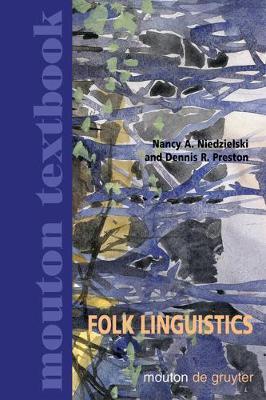Overview
Folk knowledge of language has not engaged linguists very often in the history of that field. Introductory texts often disparage folk-belief in contrast to ""scientfic truth"". In fact, language is a ubiquitous topic of discussion and general concern of the folk. They talk about grammar, pronunciation, first and second language learning, language disabilities, dialects, gender and language, and a host of other topics. This book approaches such beliefs as one of the most important aspects of ethnography. Surely what a people believe about their language is as important as any other key to an understanding of their culture.
Full Product Details
Author: Nancy A. Niedzielski ,
Dennis R. Preston
Publisher: De Gruyter
Imprint: De Gruyter Mouton
Edition: New edition
Volume: v.122
Dimensions:
Width: 15.50cm
, Height: 2.40cm
, Length: 23.00cm
Weight: 0.755kg
ISBN: 9783110175547
ISBN 10: 3110175541
Pages: 405
Publication Date: 07 March 2003
Audience:
Professional and scholarly
,
Professional and scholarly
,
Professional & Vocational
,
Professional & Vocational
Format: Paperback
Publisher's Status: Active
Availability: Out of stock

The supplier is temporarily out of stock of this item. It will be ordered for you on backorder and shipped when it becomes available.
Reviews
This fascinating book investigates how non-linguists think and talk about language, an area overlooked by linguists, as the authors show. Joseph Salmons in: Diachronica The people the book will most likely appeal to are applied linguists, the teachers of linguistics, and linguistically oriented educators. [...] It will be equally appealing to ethnolinguists and folklorists because the authors approach folk linguistic belief as one of the most important aspects of ethnography and as a key to understanding a culture. [...] The authors are to be applauded for being unafraid to tackle an issue that has long been leftout of scholarly research in linguistics. The book is recommended to anyone interested in language and linguistics and in how ordinary people regard these topics. Deni Zeyrek, Middle East Technical University, Ankara, Turkey, in: Asian Folklore Studies, Nagoya (Vol.LXI-1/2002)
"""This fascinating book investigates how non-linguists think and talk about language, an area overlooked by linguists, as the authors show.""Joseph Salmons in: Diachronica ""The people the book will most likely appeal to are applied linguists, the teachers of linguistics, and linguistically oriented educators. [...] It will be equally appealing to ethnolinguists and folklorists because the authors approach folk linguistic belief as one of the most important aspects of ethnography and as a key to understanding a culture."" [...] The authors are to be applauded for being unafraid to tackle an issue that has long been leftout of scholarly research in linguistics. The book is recommended to anyone interested in language and linguistics and in how ordinary people regard these topics.""Deni Zeyrek, Middle East Technical University, Ankara, Turkey, in: Asian Folklore Studies, Nagoya (Vol.LXI-1/2002)"
This fascinating book investigates how non-linguists think and talk about language, an area overlooked by linguists, as the authors show. Joseph Salmons in Diachronica
Author Information
Nancy A. Niedzielski is Assistant Professor at Rice University, Houston, USA. Dennis R. Preston is Professor at Michigan State University, USA.




